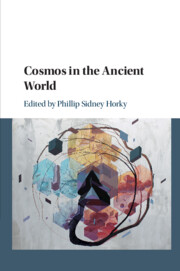Book contents
- Cosmos in the Ancient World
- Cosmos in the Ancient World
- Copyright page
- Dedication
- Epigraph
- Contents
- Contributors
- Acknowledgements
- An Historical Note on Kόσμος – Terminology
- Abbreviations
- Introduction
- Chapter 1 When Did Kosmos Become the Kosmos?
- Chapter 2 Ordering the Universe in Speech
- Chapter 3 Diakosmêsis
- Chapter 4 Aristotle on Kosmos and Kosmoi
- Chapter 5 Order and Orderliness
- Chapter 6 Polis as Kosmos in Plato’s Laws
- Chapter 7 Relating to the World, Encountering the Other
- Chapter 8 Tradition and Innovation in the Kosmos–Polis Analogy
- Chapter 9 Cosmic Choruses
- Chapter 10 All the World’s a Stage
- Chapter 11 The Architectural Representation of the Kosmos from Varro to Hadrian
- Chapter 12 “The Deep-Sticking Boundary Stone”
- Chapter 13 Cosmic Spiritualism among the Pythagoreans, Stoics, Jews and Early Christians
- Afterword
- Bibliography
- Index Locorum
- General Index
Chapter 7 - Relating to the World, Encountering the Other
Plotinus on Cosmic and Human Action
Published online by Cambridge University Press: 18 June 2019
- Cosmos in the Ancient World
- Cosmos in the Ancient World
- Copyright page
- Dedication
- Epigraph
- Contents
- Contributors
- Acknowledgements
- An Historical Note on Kόσμος – Terminology
- Abbreviations
- Introduction
- Chapter 1 When Did Kosmos Become the Kosmos?
- Chapter 2 Ordering the Universe in Speech
- Chapter 3 Diakosmêsis
- Chapter 4 Aristotle on Kosmos and Kosmoi
- Chapter 5 Order and Orderliness
- Chapter 6 Polis as Kosmos in Plato’s Laws
- Chapter 7 Relating to the World, Encountering the Other
- Chapter 8 Tradition and Innovation in the Kosmos–Polis Analogy
- Chapter 9 Cosmic Choruses
- Chapter 10 All the World’s a Stage
- Chapter 11 The Architectural Representation of the Kosmos from Varro to Hadrian
- Chapter 12 “The Deep-Sticking Boundary Stone”
- Chapter 13 Cosmic Spiritualism among the Pythagoreans, Stoics, Jews and Early Christians
- Afterword
- Bibliography
- Index Locorum
- General Index
Summary
In Neoplatonism, kosmos is the first ideal entity that human beings can emulate in their search for god-likeness. Kosmos displays perfection, harmony and completeness, all regulative of ideal selfhood. The chapter discusses cosmic activity as a human telos. It aims to contextualise human action within this ideal and to show the limits as such an ideal. First, human bodies are not totalities like the body of the universe or kosmos, nor perfect like the bodies of stars. Second, since human encounters are between parts, not totalities, human action is essentially different from the perfect and self-sufficient activities of cosmic entities. It involves either affecting or being affected in an encounter with something external to oneself. At 3.3.5.40-6, Plotinus offers a brief but telling glimpse at the challenges of human moral life. By using the example of the Trojan War, he outlines different kinds of encounters between virtuous and vicious people. Through situating the Homeric example in the Platonic framework of affecting and being affected, the text yields an opening for a theory of practical action and morality. Action emerges as ontologically relational, cosmologically situational and morally interpersonal. This human predicament is the inescapable framework of ethics for embodied human beings.
Keywords
- Type
- Chapter
- Information
- Cosmos in the Ancient World , pp. 142 - 163Publisher: Cambridge University PressPrint publication year: 2019

